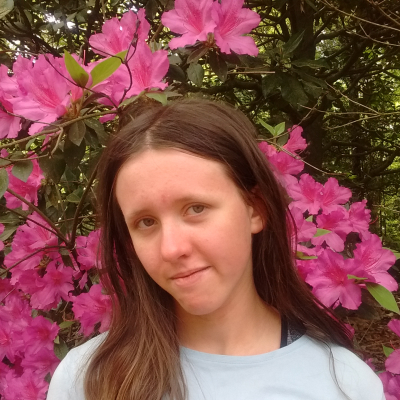Sophie Cox
Writing 101: Primate Play & Growing Up
Instructor: Kerry Ossi-Lupo
Over Our Heads:
The Hidden World of Bird Communication
Biography
I’ve wanted to study the natural world for as long as I can remember. For years I assumed research in ecology or a related field would be my dream job, but when I started college, I was starting to question that. I never liked writing lab reports or reading scientific journal articles, though I loved science articles targeted at a more general audience. I wanted the sort of science that had drawn me to science so long ago—flipping over stones to find frogs and worms underneath, talking to people who loved wildlife and hearing their enthusiasm in every syllable, and reading books and articles meant to inspire curiosity, not kill it. I was tired of scientific jargon and dense, formulaic writing that I had to read three times to understand, and I was starting to think scientific research might not be the right path for me. Then I took “Writing 101: Primate Play and Growing Up” with Dr. Ossi-Lupo. We read a lot of scientific journal articles, APA formatted and all. Yes, a lot of them were tedious and mind-numbing. But some of them were very interesting. Before taking that course, I had taken science classes and English classes, but I’d never taken a class specifically designed to include both writing and science the way this one did. I’d always loved both subjects, but in high school at least, I usually dreaded assignments that incorporated both—lab reports in science classes or research papers in English classes. Writing 101 took the best of both worlds. Our class read everything from peer-reviewed scientific papers to news articles written for the general public. We debated the pros and cons of storytelling and anthropomorphism in science writing and of doing research in the field instead of just in controlled laboratory settings. We also wrote our own research papers— first as a group project written in more traditional scientific language, then as an individual project designed to appeal to a non-scientific audience. That was the assignment I submitted to Deliberations. It gave me a chance to take a subject I cared deeply about and do my best to make it interesting to people who don’t spend their free time meandering through the woods at dawn with binoculars in hand. Throughout the semester, I was also writing articles for the Duke Research Blog. Writing for a science blog and taking “Primate Play and Growing Up” introduced me to the world of science writing, particularly science communication targeted at readers who may not have a background in science. At this point, I don’t know what I’ll be doing in ten years, but I’ve realized that I don’t just want to study nature. I want to do my best to make others care about it, too. Scientific issues don’t just affect scientists. Covid-19 is a stark example of that. Climate change is another. Science isn’t confined to laboratories and research papers. To solve some of our world’s most pressing issues, we need to make scientific knowledge accessible to everyone.
I want to thank everyone who helped me with the writing and editing process. I especially want to thank Dr. Sheryl Emch for all her help with editing and Dr. Kerry Ossi-Lupo, both for her thoughtful feedback during the editing process and for teaching “Writing 101: Primate Play and Growing Up.”
This Carolina wren and her mate have been coming to my hand for food for almost two years. The chittering noise she’s making is a type of call (usually shorter and simpler than songs, and typically produced by both sexes). The series of three-syllable notes in the background at 0:14 is a male Carolina wren’s song.
